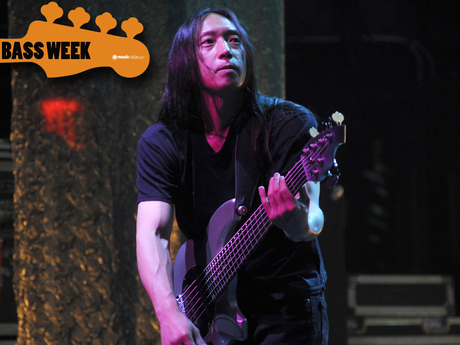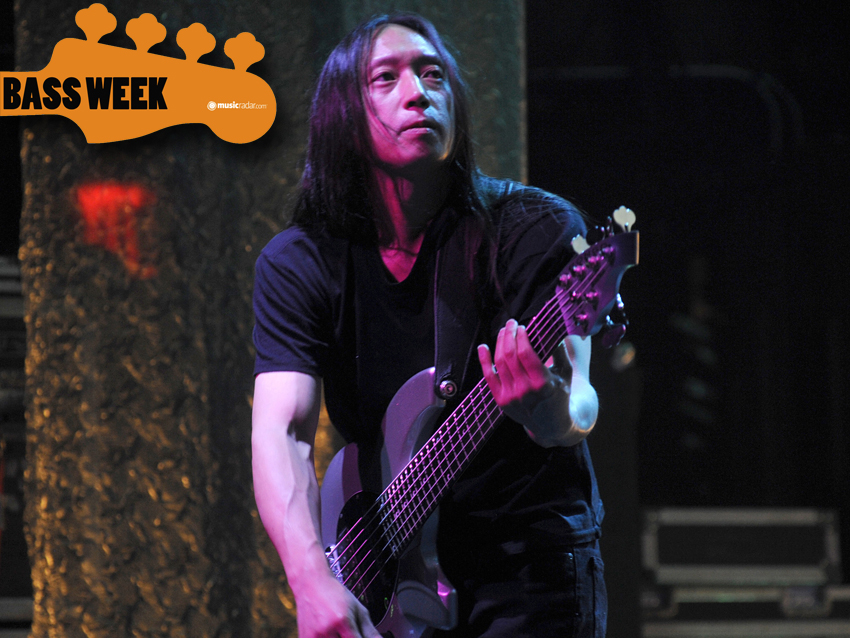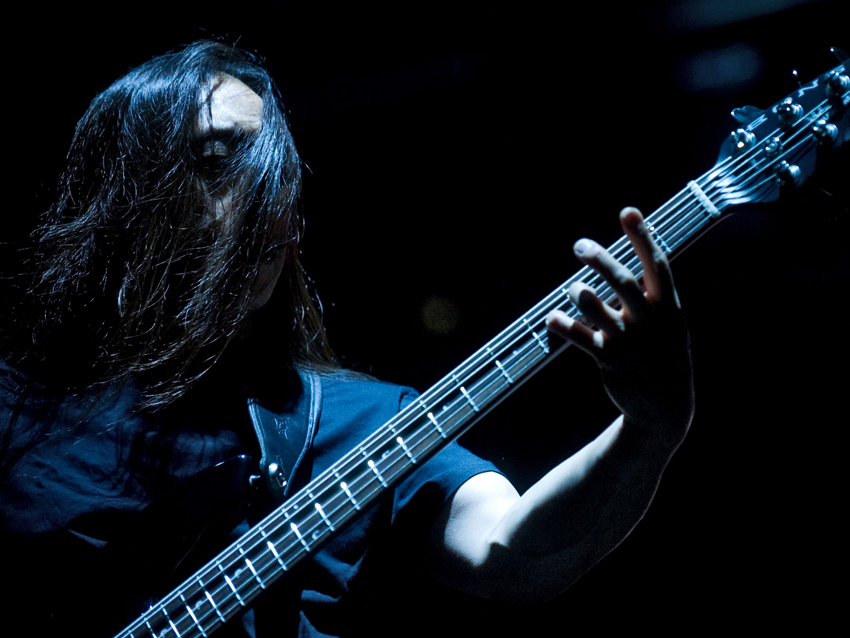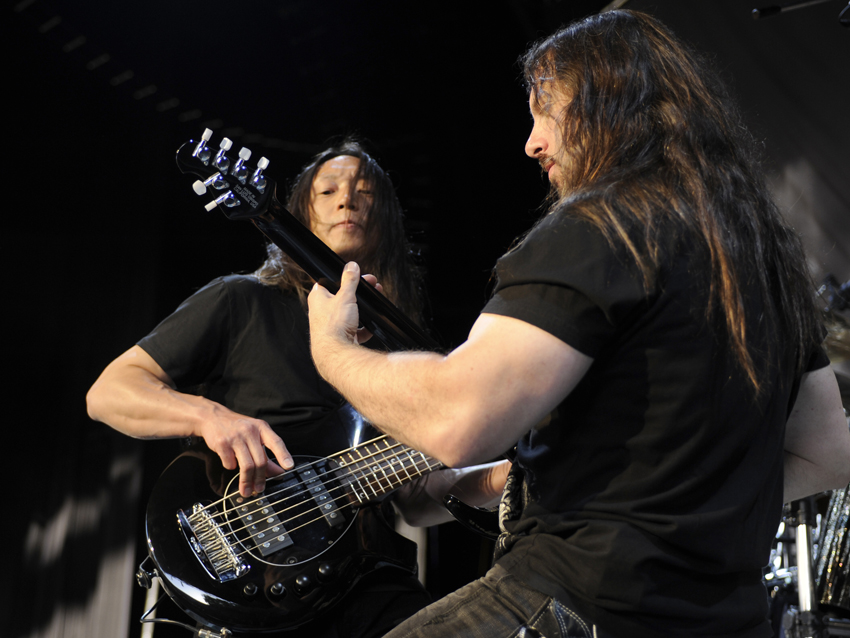
Want all the hottest music and gear news, reviews, deals, features and more, direct to your inbox? Sign up here.
You are now subscribed
Your newsletter sign-up was successful

John Myung is outstanding in his field...or even at the Beacon Theatre. © David Atlas/Retna Ltd./Corbis
"Soft-spoken"..."shy"..."a man of few words"... for years, Dream Theater bass master John Myung has been described in such terms. But the musician who MusicRadar readers voted the Greatest Bassist Of All Time in 2010 is friendly, open and extremely talkative - a regular chatty Cathy almost - especially when it comes to all things four-string in nature. (Or in his case, six.)
Currently wrapping up the first US leg of Dream Theater's knockout A Dramatic Turn Of Events tour, Myung sat down with MusicRadar in Ft. Lauderdale, Florida the other day to talk about how he's strengthening his commitment to the bass, the ways young people can be inspired on the instrument, what playing with Mike Mangini is really like...and why Death Cab For Cutie totally rules.
We talked about this a little before the interview: What do you think might make a young person pick up the bass these days?
"I think it boils down to inspiration. Young people have to want to pick up the bass - or any instrument, but we are talking about the bass here. There has to be that moment when choosing to play an instrument and really devoting yourself to it becomes a true passion.
"After inspiration comes motivation. A person has to stay interested, which is the only way one can excel on the bass. Motivation can come in many forms. As for myself, I'm always trying to make the most of my time when it comes to practicing, whether it's for one hour, three hours or all day.
"Recently, I came across something in one of Mike Mangini's books, an exercise called the C & C Limb System. To break it down, it's pinky-index, pinky-middle and pinky-ring. Then it shifts to index-ring, index-pinky and index-middle. After that it's ring-middle, ring-index and ring-pinky. Finally, it's middle-pinky, middle to ring and middle to index.
Want all the hottest music and gear news, reviews, deals, features and more, direct to your inbox? Sign up here.
"Now, you can apply this chromatically or to a scale to have more intervallic jumps in-between positions. I just started checking it out today, but I think it could be a pretty good workout because it's constantly changing, and it's changing in ways that could eliminate the physical barrier. To me, this could keep somebody motivated. Systems are good for daily practice; they provide structure. Also, this could definitely keep your hands in shape, which can inspire you to take on more challenging songs."
It sounds as much mental as it is physical.
"Yeah. And that's definitely part of staying in the game. You could apply this to anything you play, whether it's something complicated or relatively easy. I'm always looking for things to help me improve my overall technique and increase the learning curve. This exercise could be really cool."

OK, so now Myung might be taking that "man of mystery" thing a little too far. © PETER KOLLANYI/epa/Corbis
On the subject of motivation, when you speak to young people at your shows, what do they say to you? What kinds of things motivate them to want to improve their musicianship?
"I think it's desire to be creative. When they come see Dream Theater, they're inspired by what we do, and that translates to them wanting to do something. They might want to learn our songs and play our lines, but eventually they'll probably want to go off in their own directions.
"There are a lot of distractions for young people, but it gets to the point where it all becomes noise, you know? After a while, I think you have to shut a lot of things out and concentrate on your gut and your instinct. If it's a band that makes you want to do something creative, that's great. I know I had my favorite bands when I was growing up, and they made me want to pursue music."
But what made you gravitate to the bass? Most people choose the guitar, drums or keyboards. A bass player is a different kind of individual.
"That's true. I think it's just in the way that you hear music. When I was growing up, and even now, the first thing that I hear is the bass. It doesn't matter who the artist is or what the song is - I hear that sound first.
"With some of the bands that inspired me - Rush, Yes, Iron Maiden - the bass was a critical element. The bass wasn't there just to bolster the rhythm; it set the tone of the music. Everybody is different, of course, and they react to whatever hits them first or has the most dramatic affect on them. With me, it was always the bass.
"There's a serendipity to it, too. I didn't plan on becoming a bassist, but once it called out to me, I really knew it was what I wanted to pursue. But like you said, it is a very different instrument, and not everybody wants to play the bass. I've always found a lot of satisfaction in playing bass. It works off the drums and the other instruments in its own unique way, and it really allows you to get inside the music."

Music men play Music Man: Myung and Dream Theater guitarist John Petrucci on stage. © Tim Mosenfelder/Corbis
Speaking of working off the drums, how has it been playing with Mike Mangini?
"It's been great. When we had to decide on a new drummer, it was about more than playing ability, because all the people we tried out could play. It was about personality and finding the right fit. Compatibility was the focus of our decision.
"Playing with Mike is very cool. The energy he generates and the way he grooves - it's all very solid. He's so accomplished. Rhythmically, he sets up the songs beautifully and allows everything to flow. The music feels very powerful to me.
"I don't think I'm playing any differently with him. Whether that changes, I think we'll see that develop over time. But I am responding to his energy, his choices, his total approach, and it's been exciting."
Playing live versus the studio, do you find that your approach changes dramatically?
"When you're playing live, you're trying to put on a perfect show. There's a certain kind of focus that goes into it, but you're also responding to so many things that can change from moment to moment, and a lot of them are things you have no control over.
"When making a record in the studio, it's a different kind of focus. It's about moments, making every bit count. It's like you're painting. So the energy is more inward, whereas a live show is all about projecting outward. Subdivisions of time can be a pretty interesting thing to consider."
How exactly do you mean?
"What I mean is, the way a band processes subdivisional realities live. Everybody is counting a little differently and playing things that are unique to how their instrument sits in the music. It's a kind of layering that forces things to breathe a certain way.
"There are times when things completely lock and everybody is counting one particular way, but for the most part, people are counting individually and not collectively. And I tend not to count at all - I go more for feel and physical memory. That right there is what gives live music its breath."
When you play live, do you try to follow Mike Mangini, or is he following you?
"I think it's a little bit of both. I tend to listen to myself, so I would say he's locking in with me a lot. I think you have to start with yourself and where you want to take the music. A great night on stage is when everybody is on the same page. That's very hard to plan and pull off. Through listening and intuitive communication, you settle in with one another."
We know about your early influences, but who are you listening to nowadays? Is there anybody new who's doing it for you?
"Anybody new…hmm…I tend to listen to records to suit what mood I'm in. On any given day I'll listen to Peter Gabriel or Fishbone or Alice In Chains…it varies.
"Actually, a pretty new band I've gotten into is Death Cab For Cutie. They're the latest thing in rotation for me. I love their lyrics. I think Ben Gibbard is a modern-day poet. I do focus on words, too, and the lyrical content in Death Cab is pretty high."
What would be the one player or bassline that people might be shocked to learn you like?
[laughs] "I don't know! That's funny. Hmm, let me think… Well, I'd go back to Death Cab For Cutie. The bass part in I Will Possess Your Heart is such a freakin' awesome groove. I like its hypnotic quality, it's so amazing. I guess that might surprise people."
Lastly, has there been anything else you've done lately to up your game or stimulate creativity?
"There has been. I recorded a new Jelly Jam record called Shall We Descend? last year with Rod Morgenstein and Ty Tabor, and it's finally coming out. I built my own studio not too long ago, and we recorded the basic tracks there. It's a fun thing that we did, but it helps to open me up in new ways. You have to stretch when you can."
Rod is one of the best drummers ever.
"He is. He's freakin' incredible. He's like Mike Mangini - another poet on the drums. When you play with people like that, it's like they're talking to you on their instrument."
We're looking forward to hearing the new Jelly Jam disc.
"It's a cool record. It's something we did for fun and our own satisfaction. But those are the reasons why you should play music in the first place."
Joe is a freelance journalist who has, over the past few decades, interviewed hundreds of guitarists for Guitar World, Guitar Player, MusicRadar and Classic Rock. He is also a former editor of Guitar World, contributing writer for Guitar Aficionado and VP of A&R for Island Records. He’s an enthusiastic guitarist, but he’s nowhere near the likes of the people he interviews. Surprisingly, his skills are more suited to the drums. If you need a drummer for your Beatles tribute band, look him up.
